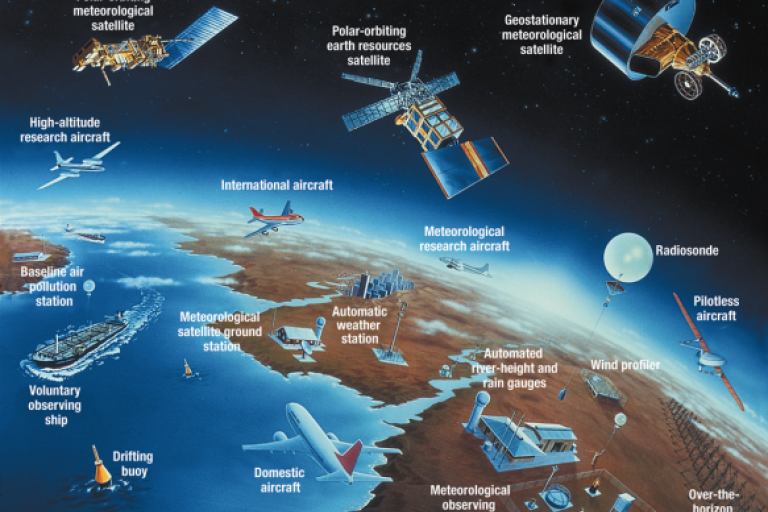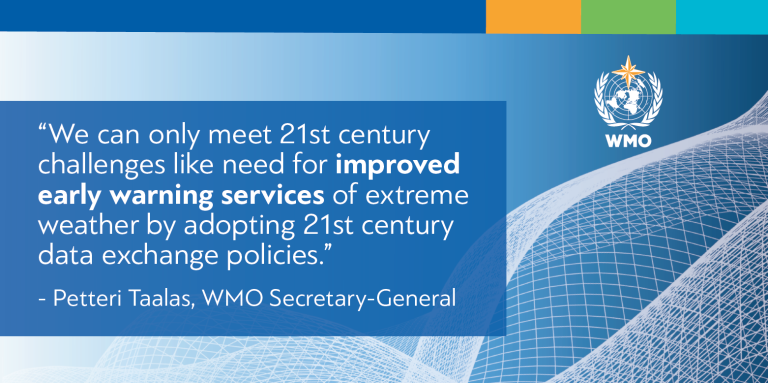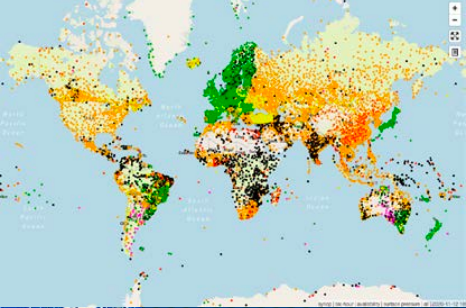Landmark Data Conference sets the scene for change
A landmark Data Conference convened by the World Meteorological Organization (WMO) has set the scene for a comprehensive modernization of the roles, rules and requirements for the international exchange of observations and other data which measure the pulse of the planet.

Geneva, 24 November 2020 (WMO) – A landmark Data Conference convened by the World Meteorological Organization (WMO) has set the scene for a comprehensive modernization of the roles, rules and requirements for the international exchange of observations and other data which measure the pulse of the planet.
The virtual Data Conference brought together more than 1,200 participants from National Meteorological and Hydrological Services, the private sector, space agencies, global data providers and users, academia and international and development partner organizations. In terms of attendance, it was the biggest conference in the 70 year-old history of WMO. And potentially one of the most important.
“This is not the end of the story. It is the beginning of a new chapter. The WMO community is a pioneer of open data. We were exchanging data even at the height of the Cold War. But times have changed, » said WMO Secretary-General Prof. Petteri Taalas. “We can only meet 21st century challenges like the need for improved early warning services to mitigate the growing impacts of extreme weather and pressure on resources by adopting 21st century data exchange policies.”

The Data Conference, from 16 to 19 November, achieved its goal of bringing a wide variety of stakeholders together in order to identify both the main obstacles to increased exchange of data and the best opportunities to overcome them. It also improved understanding of the roles of a broad array of stakeholders, including the private sector, in data provision.
“The WMO Data Conference has done a great job of bringing diverse stakeholders together to collaborate on maximizing the sharing and use of data for improved weather, climate and water services around the globe." Dr. Kevin Petty, Director of Science & Forecast Operations and Public-Private Partnerships, IBM's The Weather Company.
In addition, the Conference validated the approach being taken by WMO to construct a unified, overarching data policy supporting data exchange across all key domains involved in an Earth systems approach – weather, climate, water, atmospheric composition, cryosphere, space weather and oceans.
« We live in a time of brilliant technologies and the rhythm of innovation is increasing at an unprecedented pace, » said Michel Jean, Chair of the closing session; President, WMO Infrastructure Commission and Director General, Environment and Climate Change Canada. “It is only a matter of time before the fusion of weather, big data technologies and business applications change the way people and businesses view weather, ice, ocean, atmospheric constituents and water data, and experience the force-multiplying effects it will have on improving life and weather sensitive business decisions. »

The outcome of the highly successful virtual event will inform discussions at the 2021 WMO Executive Council and the World Meteorological Congress, which is the ultimate decision-making body of the Organization.
Congress will make the final decision on updating WMO data policy to replace existing rules – which are built on the so-called Resolution 40, which states that “WMO commits itself to broadening and enhancing the free and unrestricted international exchange of meteorological and related data and products.” The Data Conference strongly supported this ongoing commitment.
John Zillman, former WMO President and a driving force behind the adoption of Resolution 40, gave a keynote speech to the Data Conference.
“To maintain our collective weather and climate prediction and monitoring capabilities, international exchange of data remains essential. The non-rivalrous, non-exclusive nature of weather and climate monitoring and prediction make it a core public good that serves present and future generations"; he said.
More information on the conference is available here.
The World Meteorological Organization is the United Nations System’s authoritative voice
on Weather, Climate and Water
For further information contact: Clare Nullis, media officer. Email cnullis@wmo.int. Cell 41797091397










